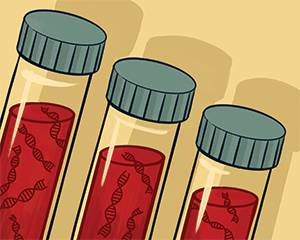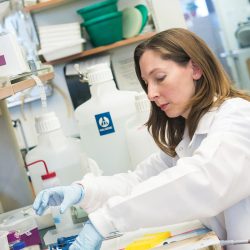A Different Way to Diagnose Cancer
Machine learning can help doctors choose the most effective treatment.

The new analysis technique is compatible with “liquid biopsy” testing equipment already approved in the United States. Illustration by Danielle Lamberson Philipp
Thanks to machine learning algorithms, short pieces of DNA floating in the bloodstream of cancer patients can help doctors diagnose specific types of cancer and choose the most effective treatment for a patient.
The new analysis technique, created by UW–Madison, is compatible with “liquid biopsy” testing equipment already approved in the United States and in use in cancer clinics. This could speed the new method’s path to helping patients.
Liquid biopsies rely on simple blood draws instead of taking a piece of cancerous tissue from a tumor with a needle.
The research team, led by Shuang Zhao, UW assistant professor of human oncology, and Joshua Lang, UW associate professor of medicine, used DNA fragments found in blood samples from a past study of nearly 200 patients and new samples collected from more than 300 patients treated for breast, lung, prostate, or bladder cancers at UW–Madison and other research hospitals in the Big Ten Cancer Research Consortium.
“Liquid biopsies are much less invasive than a tissue biopsy — which may even be impossible to do in some cases, depending on where a patient’s tumor is,” says Marina Sharifi, an assistant professor of medicine and oncologist in the UW School of Medicine and Public Health. “It’s much easier to do them multiple times over the course of a patient’s disease to monitor the status of cancer and its response to treatment.”
Published in the Winter 2023 issue



Comments
No comments posted yet.